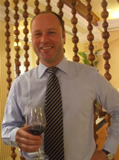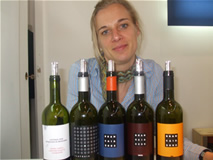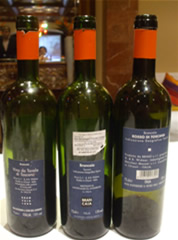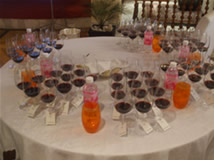At
a vertical tasting of twelve vintages, Martin Kronenberg, owner
of the Tuscan winery Casa Brancaia, presented 12 vintages of their
Super Tuscan IL Blu at Hotel Imperial in Delhi, where Subhash
Arora was present.
 |
| Cheers to IL Blu, says Martin Kronenberg |
Sassicaia,
Ornellaia, Brancaia…what do they have in common? 'Their top quality
aside, they represent different geographic regions,' explained Martin.
'Many Etruscan villages in Tuscany have names ending in ...'aia'.
So the wine producers use these names for their wines.' No wonder one
of the wines from this top Chianti Classico producer is also named Ilatraia.
Chianti Classico and Maremma
Every quality producer in the Chianti Classico area worth his Chianti has
two attributes in common. He or she must produce a Super Tuscan and must
have some property bought recently in Maremma.
Widmers are no different. IL Blu is the Super Tuscan label
from Brancaia and Brancaia in Maremma is their estate in Maremma,
which signifies that Martin and his wife Barbara Widmer had arrivati.
Being awarded Tre Bicchieri ,the most coveted award from Gambero
Rosso for all but one of the IL Blu vintages tasted from 1994-2005-
the Due Bicchieri 2002, which was a very tough vintage throughout
Italy and most of Europe due to unprecedented rains, certainly gives
them that luxury and privilege.
Brancaia is born
Barbara's Swiss parents Brigitte and Bruno Widmer were in Italy in 1981
when on a touristic visit to Tuscany, they fell in love with the landscape
and decided to buy a property where they could have a farmhouse and a
weekend getaway, a 5-hour drive from Zurich where they were living, says
the son-in-law Martin.
But there was a hitch. The ruins of the building they had set their
hearts upon, came with the vineyard estate of 8 h/A; take it or leave
it. They took it, without knowing what they would do with so much area,
not an easy task in those economically difficult times for the region.
With the help of a friendly neighbour, they undertook viticulture and
thus was born a Chianti Classico. The year was the Orwellian Nineteen
Eighty-Four. Tuscany was picking up after going through a rocky period;
Super Tuscans were the latest fashion in the US when, lo and behold!
Their 1983 Classico won the Top award at a major Chianti Classico blind
tasting!
Brancaia in Expansion
 |
| Barbara Widmer- Kronenberg with her babies |
There was no looking back. Another estate named Poppi was added in
1989, making it a comfortable 30 h/A for the Widmers. They were also
able to get permission (Italian bureaucracy can be as excruciatingly
painful as in India!) to build a common cellar.
Meanwhile, their daughter Barbara, who was an architect, weighed the options
and realised that she might not make it to the top in her profession
and chose instead to become a winemaker. She even studied winemaking
and enology in Zurich.
She was the mid-wife for the Chianti Classico baby born in 1998- and
has been producing one every year since.
The property in Maremma was acquired in 1997; the most hyped up year
for Tuscan wines by the Americans and the British but in fact, not as
great as perceived, admits Martin. Located near Grosseto, about 12 kms
from the sea, in the Morellino di Scansano appellation zone, this 120
h/A estate produces the Ilatraia.
But IL Blu was at the center stage at the vertical tasting of 1994-2005
at Hotel Imperial this afternoon.
The True Blue Super Tuscan
IL Blu is a Super Tuscan made with Sangiovese in the majority, blended
with Merlot and Cabernet. Initial years saw 55% of Sangiovese, 40% Merlot
and 5% Cabernet, which continued with Barbara's first vintage. But she
decided to make a switch of 5% from Sangiovese to Merlot, making it slightly
softer and a bit more luscious. The blend continues to have 50% Sangiovese
and 45% Merlot since 1999.
With this background, we plunged into the Blu world of Brancaia, with
12 glasses pre-poured at the perfect temperature of around 16° C,
with duly decanted and bottled back liquid under the supervision of the
French, Hotel Imperial sommelier, Stephan Soret.
Martin did comment before the commencement of the tasting that the company
philosophy was not to produce wines for tasting but wines that could
be enjoyed with or without food, preferably the latter. One sip should
lead to the next and the next, till the next bottle beckons.
I'd drink to that!
VERTICAL TASTING IL Blu- 1994-2005
IL Blu 1994
 |
| A few of Brancaia labels |
Despite the literature classifying it as an IGT Rosso Toscana, the bottle
told another story. Until 1994, top producers were obliged to conform
to either DOC or DOCG like Chianti Classico, or label their wine
as Vino da Tavola which the bottle label correctly indicated.
A brick red colour with an orange hue gives away the old age of the bottle.
Typical Sangiovese aroma with a light varnish touch, balanced acidity
and firm tannins make this wine still alive though not in the prime of
life. 
IL Blu 1995
Brick brown red colour, the wine dies on the palate. It was not a great
vintage as Martin points out. Earthy flavour, the wine has gone over
the peak 
IL Blu 1996
Colour is still dark cherry colour, it is fresh and full bodied wine
with complex flavours of raspberry and cherry and a long end. 
IL Blu 1997
This was the vintage that was a great year for Super Tuscan wines, which
put Tuscany on the world wine map. It is a key vintage for Brancaia too.
The wine is still closed a bit, but the Sangiovese sweetness impresses
on the palate. Aromas are bold and complex. There is good harmony between
tannins and acidity. 
IL Blu 1998
This is the first vintage crafted by Barbara. It has fresh fruit aromas
and slimmer body than the '97. Tannins are a bit strong but well rounded.
Flavour gets better in the glass after 15-20 minutes. Cherry flavours
and spices abound. 
IL Blu 1999
Fresh fruit aromas of cherries and stewed prunes. Solid body but slim
and elegant wine. Tannins are quite velvety and flavour is persistent
on the end. A wine that will continue to mature for the next few years.
Martin tells us it will drink well till 2016. 
IL Blu 2000
Not an unusual year. Winter wasn't really winter and spring was not
rally spring. Floral aromas. Medium to full body with fine tannins and
a long, pleasant end. 
IL Blu 2001
Lovely bouquet of ripe berries and toasted oak. Inky colour. Very well
structured, rich and full bodied. Great mouthfeel, with the full flavours
going right till the end, leaving a lasting impression of sweet vanilla
oak and plums.
This turned out to be my most favourite wine of the afternoon. 
IL Blu 2002
This was a universally poor vintage for Tuscany with rains in August
and September. Many producers could not make good quality. But apparently
Brancaia was not hit too badly and they were able to produce a full-bodied
wine with smoky aromas of black fruit with a spicy layer. It had slightly
chocolaty flavour with integrated tannins. Very long and complex smoky
and spicy finish. This is the kind of wine which shows what a good producer
can do even in a bad vintage. This wine is easy drinking, not to age. 
IL Blu 2003
Harvested earlier, due to intense heat that year. The full bodied wine
has a lot of character with slightly higher alcohol at 13.5%. Dark and
chewy, lots of berries on the palate with minerals in the background. 
IL Blu 2004
This has been a classic vintage in Tuscany. Though the wine is still
young with the classic ruby red colour, it shows spices on the palate
with a fruity and floral nose reminiscent of roses. Undertones of cherries
and blackberries on the palate with an exceptionally long length. The
velvety balanced tannins make this wine a delicious wine with proper
food and can be enjoyed even now, after decanting for an hour and letting
it breath in the proper glass while enjoying with the meal. 
IL Blue 2005
 |
| Service for 4- Pre-poured 12 Vintages of IL Blu |
Bottled only last year, this wine is not ready to drink yet. But it
is a fruit forward wine with oak presence still domineering. The coffee
flavour makes it a bit complex. Subtle aromas of minerals and cherries,
The full-bodied wine has refined tannins and a long finish. 
This was a 12- vintage vertical tasting, apparently, first of its kind
in India. According to Martin, the young Super Tuscans should be decanted
for 30-60 minutes before serving and are best enjoyed with serious food,
like steaks and the Tuscan Osso Buco, which is unfortunately easy to
find in India, but I could suggest sikandari raan, rack of lamb
or even light marinated mutton kebabs to go with these wines.
The Challenges
Martin rightly brought out the two challenges being faced by good Super
Tuscan producers today. The biggest challenge is with people wanting
fine wines that can be drunk young and Super Tuscans take a few years
to evolve in the bottle, typically 5 or more to make them start showing
off. The second is the competition from producers from the bottoms up
rather then top down. During the last 2 years several newer and younger
producers have started coming out with much improved quality,' says Martin.
So how do they cope with this competition? 'Our philosophy is that every
grape should be capable of producing IL Blu. So we constantly strive
to improve the quality of the grape in the vineyard,' says Martin. Of
course it helps that Barbara is a good winemaker and they have the assistance
from the internationally renowned Carlo Ferrini since 1992 when he started
wine consultancy. His personality is well reflected in the wines which
have gradually been shifting to the modern style, in an effort to make
them easy and early drinking yet making them age worthy.
It is too early to say whether these wines will mature beyond twenty
years. But the taste of wines as old as 14 years does suggest the life
of around 17-20 years for IL Blu from Brancaia.
Subhash Arora
Wines from Casa Brancaia are being imported exclusively by the Wine
Park in Mumbai, owned by Vishal Kadakia.